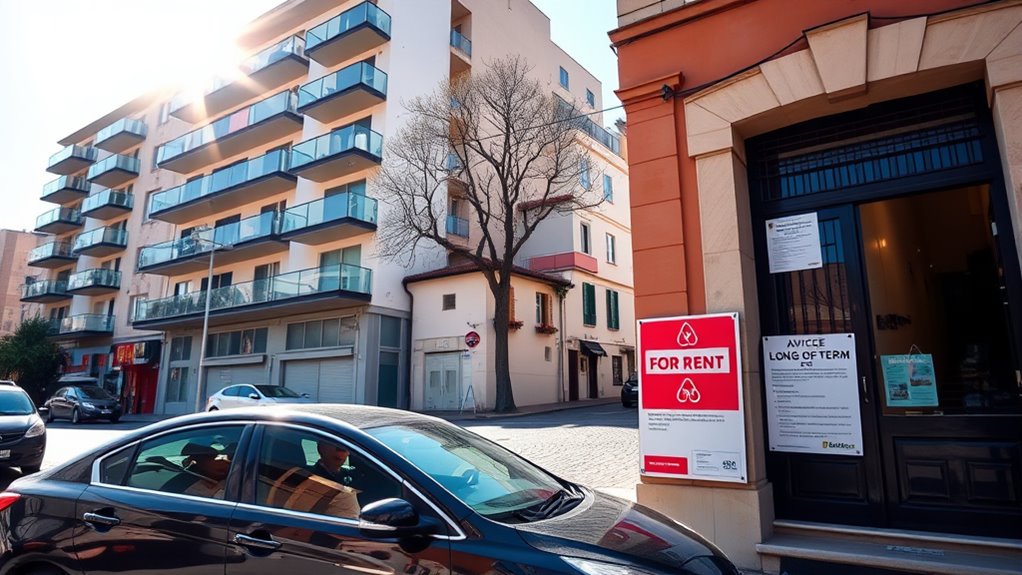Deciding between Airbnb and long-term rentals abroad hinges on balancing income potential with effort and legal risks. Airbnb can boost your profits during peak seasons but requires active management, higher fees, and compliance with local laws. Long-term rentals offer stability with lower hassle, but income is steady and often less lucrative. To make the best choice, consider your property’s location, market demand, and your management capacity—more details can help you plan wisely.
Key Takeaways
- Airbnb offers higher seasonal income potential but involves higher management fees and regulatory complexities.
- Long-term rentals provide stable, predictable income with lower management costs and fewer legal restrictions.
- Location significantly impacts profitability; tourist hotspots favor Airbnb, while residential areas favor long-term leasing.
- Legal compliance, licensing, and local zoning laws are crucial to avoid penalties and ensure smooth operations abroad.
- Diversifying your property portfolio between both strategies can balance risk, optimize income, and adapt to market fluctuations.
Comparing Income Potential and Return Rates

When comparing income potential and return rates, it’s clear that both Airbnb and long-term rentals offer distinct advantages. With Airbnb, you can earn considerably more during peak seasons, especially in popular cities, sometimes doubling or tripling what long-term rentals generate. For example, larger Airbnb properties in Boston can earn over 112% more than comparable long-term units. However, Airbnb income is highly seasonal and sensitive to occupancy fluctuations, meaning gaps can lead to no income during off-peak times. Long-term rentals provide steady, predictable cash flow, often around $2,000+ monthly, with lower volatility. While they cap rent increases, they offer reliable income and fewer management challenges. Market demand varies: urban tourism hotspots favor Airbnb, while stable residential areas lean toward long-term rentals. Demand patterns fluctuate seasonally, influencing the stability of rental income throughout the year.
Understanding Market Demand and Seasonal Trends

Market demand and seasonal trends considerably shape the income potential of property investments abroad. Peak seasons, driven by climate and tourism events, boost short-term rental occupancy and rates, while off-peak periods often see lower demand, increasing income volatility. Long-term rentals provide more stable income year-round, unaffected by seasonal shifts. Holiday periods like Christmas and summer vacations cause booking spikes, but require flexible pricing and availability. Emerging destinations may experience irregular seasonal patterns as they develop tourist bases. Additionally, the rise of remote work and extended stays is expanding demand for mid to long-term rentals, especially properties with work-friendly amenities. This trend reduces traditional seasonality, increasing off-peak utilization. The growth of remote work has led to a surge in demand for properties suitable for extended stays, which can help offset seasonal fluctuations. Understanding these demand cycles helps you optimize your property’s rental strategy for maximum profit throughout the year. Additionally, being aware of seasonal occupancy rates allows investors to plan their marketing efforts and adjust prices accordingly to maximize revenue during peak and off-peak periods, leveraging market demand to enhance profitability. Moreover, analyzing seasonal demand patterns helps in forecasting revenue and managing property maintenance schedules effectively.
Evaluating Management Effort and Operational Costs

Evaluating management effort and operational costs is essential for understanding the true profitability of your overseas property investment. Managing a short-term rental like Airbnb involves high management fees—up to 50% of gross income—and frequent guest communication, cleaning, and maintenance. The integration of technology, such as automated messaging and keyless entry systems, can help streamline some of these tasks but may entail additional upfront costs. In addition, Kia Tuning techniques such as ECU remapping can optimize vehicle performance, potentially reducing maintenance costs for property owners who rely on their vehicles for property management purposes. Modern wall organization systems and aesthetic decor enhancements can also reduce clutter and streamline maintenance routines, contributing to overall efficiency. In contrast, long-term rentals generally have management fees between 8% and 12%, covering tenant screening, rent collection, and repairs. Consider these key points:
Managing short-term rentals incurs higher fees and effort compared to long-term leases.
- Short-term rentals demand more active management and higher ongoing costs.
- Maintenance costs are typically higher for short-term rentals due to frequent turnover.
- Operating expenses, including utilities and cleaning, tend to be higher for short-term options.
- Outsourcing management reduces effort but increases expenses, affecting net profit.
Additionally, the higher turnover rate in short-term rentals often leads to increased vacancy periods and associated costs, impacting overall profitability.
Analyzing Legal Regulations and Local Policies

You need to understand the legal restrictions and zoning laws that govern property use in your target market, as they can *vital* impact your plans. Ensuring lease compliance and obtaining the right licenses are *essential* steps to avoid penalties and operational disruptions. Staying informed about local policies helps you navigate the complexities of property regulations and protect your investment. Additionally, recent legislative reforms, such as the Renters Reform Bill, can alter tenant rights and landlord obligations, further influencing your property strategy and the regulatory environment. Being aware of legal and regulatory frameworks related to property use can also help you incorporate practices like meditation and mindfulness to reduce stress during complex legal processes. Leveraging knowledge of Credit Card Processing & ISOs can also streamline your transactions with tenants and service providers, enhancing operational efficiency. Furthermore, understanding subconscious vibrational power can assist you in maintaining a positive mindset while managing property investments and legal challenges.
Legal Restrictions and Zoning
Legal restrictions and zoning laws play a pivotal role in shaping what types of rental properties you can operate abroad. These laws determine where short-term and long-term rentals are permitted and under what conditions. You need to be aware of local zoning districts, which classify land into residential, commercial, or mixed-use zones, each with different rules. Here are some key points:
- Short-term rentals may be restricted or require permits in residential zones.
- Long-term rentals are generally allowed but must follow density, height, and setback limits.
- Commercial zones might permit rentals more freely but often demand licensing.
- Neighborhood character and district overlays can impose additional restrictions or registration requirements. Understanding local zoning classifications is crucial for compliance and successful rental operations. Monitoring local regulations regularly is essential to ensure your rental operations remain compliant with any changes in laws or policies. Staying updated on legal requirements helps you avoid penalties and guarantees your rental operation stays compliant. Additionally, being aware of community engagement and approval processes can facilitate smoother approval for rental permits and licenses.
Lease Compliance and Licensing
Understanding the legal landscape for leasing properties abroad is key to maintaining compliance and avoiding penalties. You must guarantee your lease agreements meet local laws, which vary widely. Non-compliance can lead to fines, eviction issues, or legal disputes. Licensing requirements for short-term rentals differ by country and city; for example, France mandates registration with the town hall, while Italy requires registration with tax authorities. Use local property managers or legal counsel to navigate these rules effectively. Digital tools can help monitor lease compliance remotely, tracking insurance, maintenance, and occupancy. Regular oversight prevents violations and protects your investment. Being aware of local regulations and understanding the importance of lease compliance ensures your rental activities remain lawful and profitable. Additionally, understanding legal regulations helps prevent inadvertent violations that could jeopardize your rental income or lead to legal action.
Assessing Risk Factors and Insurance Considerations

When evaluating the risks associated with property abroad, it’s essential to contemplate both the types of insurance coverage available and the unique challenges posed by international markets. Proper insurance can protect against theft, natural disasters, liability claims, and tenant-related issues. To guarantee exhaustive coverage, consider these key points:
Evaluating international property risks requires comprehensive insurance covering theft, disasters, liabilities, and tenant issues.
- Verify if your property insurance includes protections for buildings, belongings, and outbuildings against local risks.
- Secure liability insurance to cover legal fees, medical expenses, and damages caused by tenants or guests.
- Obtain international renters or personal liability insurance to safeguard tenant belongings and protect against accidents.
- Use global property coverage policies that comply with local laws across multiple countries, minimizing compliance risks. Additionally, many international insurance providers offer specialized policies tailored to expatriates and foreign property owners, which can provide more comprehensive protection. These policies may also cover currency fluctuations and other international-specific risks to better suit your needs.
Understanding these factors helps mitigate potential financial losses and ensures your investment stays protected abroad.
Impact of Geographic Location and Property Type

The location and type of property you choose considerably influence your rental strategy and potential returns. In tourist hotspots and business hubs, Airbnb can command higher nightly rates, boosting annual income, but seasonal fluctuations and regulations can impact stability. Long-term rentals offer more predictable income with lower vacancy rates, especially in less-trafficked areas. Urban centers like Los Angeles or Chicago may see Airbnb generating 30% or more extra revenue, but market demand varies. Property type also matters: single-family homes attract long-term tenants, providing steady cash flow, while condos or apartments near attractions suit short-term rentals better. Larger or luxury properties can yield higher short-term income but demand more management. Overall, location and property type shape your income stability, management needs, and regulatory considerations. Additionally, property size and amenities play a significant role in attracting tenants or guests, affecting occupancy rates and profitability.
Strategic Considerations for Diversified Investment Portfolios

Diversifying your real estate investments across different strategies helps reduce reliance on any single income source and enhances overall portfolio stability. By spreading investments across buy-to-let, short-term rentals, commercial leases, and joint ventures, you balance risk and growth. Consider these key points:
- Risk balancing: Mix conservative properties like residential rentals with aggressive assets such as commercial or industrial spaces. Diversification in property types and strategies ensures that downturns in one sector do not severely impact your entire portfolio.
- Partnership advantages: Joint ventures with developers can disentangle higher growth potential and lower entry barriers.
- Continuous monitoring: Regularly rebalance your portfolio to adapt to market changes and meet diversification goals.
- Sector-specific strategies: Investing in niche markets like healthcare or hospitality minimizes exposure to broader market cycles.
Strategic diversification helps optimize returns while managing risks, especially in international real estate markets.
Frequently Asked Questions
How Do Currency Exchange Rates Impact Foreign Rental Income Profitability?
Currency exchange rates directly affect your foreign rental income profitability because fluctuations can change how much you get when converting to your home currency. If the local currency weakens, your converted income drops, reducing profits. Conversely, if it strengthens, you’ll see higher returns. Managing this risk involves monitoring rates, using dual accounts, negotiating contracts in stable currencies, and considering hedging options to protect your earnings from currency swings.
What Are the Tax Implications for Foreign Investors Renting Abroad?
Think of your foreign rental income as a river flowing across borders—you need to report every drop. You must include it on your home country’s tax return, converting it to your local currency. Deduct expenses like mortgage interest and management fees. Be aware that gains from selling foreign property are taxed both abroad and at home. Claim foreign tax credits to avoid double taxation, and stay updated on changing tax laws that could impact your obligations.
How Does Local Infrastructure Quality Influence Rental Property Success?
You recognize that the quality of local infrastructure directly impacts your rental property’s success. Good transportation options, nearby amenities, and safety features attract more tenants and justify higher rent. Well-maintained roads, public transit, and accessible services make your property more desirable, leading to higher occupancy and steady income. Investing in areas with strong infrastructure guarantees better tenant retention and potential appreciation, maximizing your rental income and overall investment returns.
Are There Specific Visa or Immigration Policies Affecting Property Investment?
You wonder if visa policies impact your property investment plans. The answer is yes—certain programs require you to meet strict criteria like clean criminal records, proof of funds, and specific investment thresholds. These rules can influence how you acquire and maintain property abroad. If you don’t comply, your visa could be revoked, jeopardizing your investment. Staying informed and meticulous guarantees your property goals align with immigration requirements, safeguarding your plans.
What Are the Typical Tenant Screening Challenges for International Landlords?
You’ll face several tenant screening challenges as an international landlord. Outdated or incomplete background data can lead to wrong tenant judgments, risking your property. Privacy laws and varying regulations make data collection tricky. Language barriers, cultural differences, and time zone gaps complicate communication and verification. Additionally, limited access to reliable local screening services and technological barriers can hinder thorough background checks, increasing your risk of accepting unsuitable tenants.
Conclusion
Ultimately, whether you choose Airbnb or long-term renting, you balance profit against effort. Airbnb offers quick gains and flexibility but demands constant management and risk. Long-term rentals provide steady, predictable income with less hassle but potentially lower returns. It’s like choosing between a lively, unpredictable adventure and a calm, reliable journey. Whichever path you take, remember, your property’s success depends on understanding both the market’s rhythm and your own comfort zone.









